
luisfpizarro - Fotolia
Post Office scandal: Phase four’s rogues’ gallery
Phase four of the public inquiry into the Post Office Horizon IT scandal revealed ‘a parade of liars, bullies, amnesiacs and arrogant individuals’ that made up the teams investigating and prosecuting subpostmasters
The public inquiry into the Post Office Horizon IT scandal has just completed its fourth phase, with the closing statements of barristers condensing months of hearings, often covering complex issues of law, into easily digestible statements that raise the question of serious criminality within the Post Office.
Hundreds of criminal convictions are set to be overturned en masse if unprecedented legislation gets through Parliament as planned. These relate to former subpostmasters and branch workers who were convicted based on evidence from the Post Office’s controversial Horizon computer system. They come on top of more than 100 wrongful convictions already overturned.
What is clear is something went wrong – and it was no accident. An “us and them, blinkered and win at all costs culture”, combined with the prioritisation of commercial interest and personal gain over human welfare, plus a large dose of incompetence, all within an organisation displaying the characteristics of a cult, saw Post Office investigators and lawyers pin the blame for phantom losses on subpostmasters. Tim Moloney KC, representing former subpostmasters, described this as an “obscene reversal of the presumption of innocence”.
Those accused were deemed guilty unless they could prove the computer was wrong, which, according to the Post Office’s “stock line”, was never the case, according to Moloney. Without data and an understanding of how the system works, this was “something that they could not prove or probably could not prove”, he told the inquiry when summing up the latest inquiry phase.
Post Office staff continued to pursue the tactic of blaming subpostmasters, which included intimidating them into pleading guilty to the lesser charge of false accounting rather than theft, for which there was no evidence. The goal was to recover the money that the computer system wrongly recorded as missing – a goal pursued by a team that was incentivised to do so.
Phase four of the Post Office Horizon IT Inquiry has named names and forensically questioned the faces behind those names, which are now known to an eventually interested public. As Moloney said: “It is only when the tide goes out that you can see who has been swimming naked.”
Read more from the Post Office Horizon IT Inquiry
- Phase one round-up: The British people are waking up to the scandal that happened under their noses.
- Phase two round-up: Post Office scandal – ‘cock-up or cook-up’?
- Phase three round-up: Post Office scandal – cover-up a ‘dark chapter’ in government, corporate and legal history.
Sam Stein KC, also acting for victims of the scandal, said in closing: “Phase four has pulled back the curtain on the decades of the great Post Office cook-up and cover-up. That has been made up of these four key ingredients: The disdain and dislike of subpostmasters by the Post Office and their employees because, and I quote a Post Office investigator, they are ‘all crooks’; secondly, an appalling lack of professionalism of lawyers combined with bullying investigators; thirdly, a refusal to investigate the Horizon system because of what that would reveal; and lastly, and finally, fourthly, the Post Office cult – the almighty Post Office must be protected at all costs.”
He described Post Office witnesses before the inquiry as a “rogues’ gallery” and a “parade of liars, bullies, amnesiacs and arrogant individuals”.
Phase four laid the ground for the very real prospect that former Post Office staff and those supporting the Post Office at external companies could face criminal investigation themselves – and this time it won’t be based on flimsy and inaccurate evidence, but months of rigorous investigation by the inquiry, backed up by years of the same by subpostmasters, campaigners and journalists, including this publication.
Maloney said: “At worst, [their] actions now, as perhaps just a starting point, lay some witnesses open to rigorous criminal investigation.”
Today, the nation is watching and the world is watching. Since the airing of ITV’s drama about the scandal, Mr Bates vs The Post Office, and the accompanying documentary, The Real Story, the Post Office scandal has entered the UK’s public and political discourse, even triggering unprecedented emergency legislation. But this has not stopped at the country’s shores – the world is watching too.
Computer Weekly first exposed the scandal in 2009, revealing the stories of seven subpostmasters (see timeline of all Computer Weekly articles about the scandal at the foot of this article).
The rogues and their evidence
Jarnail Singh, former head of criminal law at the Post Office
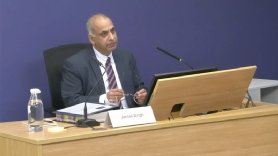
Jarnail Singh worked in the Post Office’s criminal law team as a senior lawyer during a period when hundreds of subpostmasters were prosecuted for financial crimes based on evidence from the Horizon IT system. His name is widely known in the public inquiry, appearing in many documents throughout.
He was not even a qualified criminal lawyer and ran a private practice alongside his job at the Post Office, where he had risen to the top because he was the only person left after the organisation outsourced much of the work.
During the previous phase of the Post Office Horizon IT Inquiry, which looked at the operation of the Horizon system, evidence emerged that in 2012, Singh made celebratory comments to colleagues in an email following the successful prosecution of former subpostmaster Seema Misra, who was sent to prison after being found guilty of theft due to unexplained accounting shortfalls in her branch, despite there being no evidence against her.
He also said the victory would deter other subpostmasters from jumping on the “Horizon bashing bandwagon”. At the time, Computer Weekly’s first investigation of the Horizon system had spread the word that multiple subpostmasters were experiencing difficulties balancing their accounts with the system.
- Read Computer Weekly’s report on Singh’s evidence in phase four
- Watch Jarnail Singh’s evidence in phase four of the inquiry
John Scott, former head of security at the Post Office
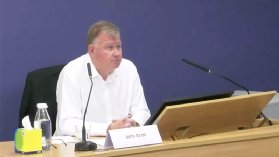
John Scott was head of security at the Post Office and was named by the Post Office during the 2021 Court of Appeal hearing as the person who in 2013 instructed staff to shred documents that undermined the Post Office’s insistence that its computer system was robust, amid claims that errors in the system caused unexplained accounting shortfalls. During the public inquiry, Scott "categorically" denied the allegation.
One witness in phase four of the inquiry, David Pardoe, a former security executive, said he remembered “with some clarity” Scott assuring the security team that Horizon was reliable. He said former policeman Scott drilled home “persistent sentiment” that Horizon was “fit for purpose” and that he was never in discussions about halting prosecutions because “it was clear there was a fear that doing that would immediately cast doubt” on previous prosecutions.
Mandy Talbot, former Post Office lawyer
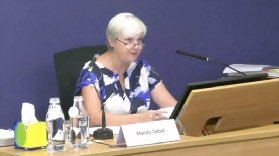
Described by Sam Stein KC as the “Post Office’s very own evil robot”, Mandy Talbot epitomised the institutional amnesia among the witnesses during this phase. In 2006, the former Post Office lawyer was at the centre of a legal battle designed to silence subpostmaster Lee Castleton when he raised questions about the robustness of Horizon.
She was repeatedly asked by barristers in an inquiry hearing to name people who had given direction on the strategy, but again and again, she said the direction had come from “Post Office Limited” and failed to remember a single individual involved in the strategy.
Talbot had also been involved in an earlier dispute, which saw another subpostmaster, at a branch in Cleveleys, Lancashire, challenge the reliability of Horizon. This case ended in an out-of-court settlement and the subpostmaster signing a confidentiality agreement. The Post Office denied the computer system was unfit for its purpose, but a report jointly commissioned by both parties in the run-up to the court hearing raised significant questions about the system.
In his report, expert witness Jason Coyne, then of Best Practice Group, said most calls made by the subpostmaster to the helpdesk were “without doubt” related to system failures, either hardware, software or interfaces, and only 13 of the calls he looked at “could or should” have been considered as the subpostmaster requesting help or guidance.
But during a phase four hearing, Talbot, a trained lawyer, said she did not think evidence about computer problems in Coyne’s report was relevant in Castleton’s case about alleged problems with Horizon, and the Post Office’s denial of them, claiming she thought Cleveleys was an “isolated case”.
- Read Computer Weekly’s full report on Mandy Talbot’s evidence
- Watch Mandy Talbot’s evidence in phase four of the inquiry
Graham Ward, former Post Office investigator
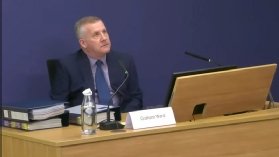
Graham Ward, who currently works for the Metropolitan Police, was a senior investigator at the Post office. Phase four of the Post Office Horizon IT Inquiry revealed that he suggested altering a Fujitsu engineer’s witness statement to prove computer errors were not to blame for subpostmasters’ shortfalls.
The inquiry was shown evidence that Ward suggested Fujitsu’s Gareth Jenkins, who was acting as an expert witness in a case against a subpostmaster, should change his witness statement to remove the reference to a “system failure”. This was in relation to the prosecution of subpostmaster Noel Thomas in 2006, at a time subpostmasters were challenging the system’s integrity. In the email to Fujitsu staff, Ward wrote: “Given the allegations made by the postmasters, I’m sure you’ll agree that it’s very much in ourselves and Fujitsu’s interest to challenge the allegations and provide evidence that the system is not to blame for the losses provided.”
Thomas was sentenced to 12 weeks in prison, where he spent his 60th birthday. His wrongful dismissal conviction was overturned in 2021. He was one of the first seven subpostmasters interviewed by Computer Weekly in its 2009 investigation.
Gary Thomas, former Post Office investigator
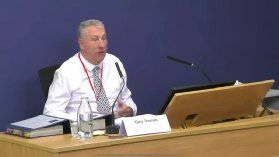
In 2015, the Criminal Cases Review Commission (CCRC) began examining claims from former subpostmasters that they had been wrongfully prosecuted by the Post Office and convicted of financial crimes. Faced with CCRC investigation, Post Office executives requested documentation from those who had investigated the prosecuted subpostmasters.
That same month, following one such request, former Post Office investigator Gary Thomas told fellow investigator Graham Ward, who he referred to as his old Gunners mate, that he was “pleased” to say he had the electronic documents relating to two cases he had worked on.
When asked why he was pleased, he replied: “Because I want to prove that there is no FFFFiiinnn [sic] ‘Case for the Justice of Thieving Subpostmasters’ and that we were the best investigators they ever had and they were all crooks!!” The email included a derogatory reference to the Justice for Subpostmasters Alliance (JFSA), a group of former subpostmaster campaigners who proved in the High Court in 2019 that the Horizon system was flawed.
- Read Computer Weekly’s report about Gary Thomas’s evidence
- Watch Gary Thomas’s evidence in phase four of the inquiry
Helen Rose, former Post Office auditor

Former Post Office auditor Helen Rose was involved in a legal battle with former subpostmaster Lee Castleton, who was made bankrupt after challenging the Post Office in court after it blamed him for unexplained accounting shortfalls. Rose produced a witness statement in court that differed from her original audit report.
During the latest hearing in the Post Office Horizon IT Inquiry, Rose was questioned about her reports. It emerged there was an audit of Castleton’s branch in 2004 for which Rose wrote a report, but when she produced a witness statement in 2006, it only used information that supported the Post Office’s case. The Post Office auditor omitted details that were in the audit report of Castleton’s branch, which supported his claims that shortfalls were caused by computer evidence and retained details that went against him.
In the 2004 audit report, Rose wrote that Castleton was “very pleased” to see the auditors and had told her he had been in regular contact with his Post Office area manager about his concerns. He believed issues stemmed from computer errors and that none of his staff had committed theft, she wrote. This detail would have supported Castleton’s case when in court, but Rose omitted it from her witness statement, which was written two years later, and also included details suggesting he had been drinking alcohol while the audit was being carried out, which was not in the original audit report.
- Read Computer Weekly’s report about how Helen Rose changed her story for witness statement used to destroy subpostmasters
- Watch Helen Rose’s evidence in phase four of the inquiry
Rob Wilson, former head of criminal law at Royal Mail
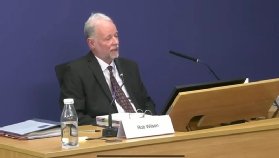
In 2010, Rob Wilson, former head of the criminal law team at Royal Mail, warned Post Office executives of the risks associated with a plan to launch an independent inquiry into the Horizon system, amid questions over its robustness.
They ended up carrying out a one-sided internal investigation and produced a whitewash report, which only reported Horizon’s advantages.
Wilson was responsible for subpostmaster prosecutions, many of which were based on evidence from the Horizon system. But he was originally left out of the email chain regarding setting up a Horizon investigation. On being included in the 2010 email chain, Wilson reacted to the planned investigation into Horizon by stating that if there were integrity issues, an investigation was not only needed, but imperative. But he then gave a long list of reasons why the Post Office shouldn’t do it.
During a phase four hearing, inquiry barrister Jason Beer KC put it to Wilson that while his first sentence supported an investigation, his response was actually a list of reasons not to do the proposed investigation: “The rest of [the email] is a but, isn’t it?”
Wilson admitted in the inquiry that his response should have only stated the need and importance of an investigation, but in fact the email described, at length, the risks to the Post Office of investigating the Horizon system.
In his email to Post Office executives, he warned that subpostmasters would use an investigation into the Horizon system to challenge the Post Office if there were shortages in their branches, writing: “The only way they are left to challenge our evidence when they have stolen the money is to blame Horizon.” Wilson justified this line because he was angry when he wrote it and went “over the top”.
- Read Computer Weekly’s report on Wilson’s evidence
- Watch Rob Wilson’s evidence in phase four of the inquiry
Elaine Cottam, former retail line manager at the Post Office

Elaine Cottam, former retail line manager at the Post Office, told the Post Office Horizon IT Inquiry that despite having signed a witness statement to be used in court, she has no recollection of writing it. The witness statement was to be used in court by the Post Office in a legal dispute with one of the 100-plus branches she oversaw in her role.
During Cottam’s evidence in phase four of the public inquiry, it emerged that her witness statement contained an attachment of call logs of requests for support made by the subpostmaster at the branch in question. But although the witness statement said attachments contained call logs from 10 January 2000 until 30 November 2000, the call logs attached were only from 9 February to 21 June. This meant logs of helpdesk calls, some of which were made by Cottam on the subpostmaster’s behalf, which had evidence that the subpostmaster was experiencing Horizon problems, were missing. Cottam said she didn’t remember any of the witness statement and would not understand the call logs.
When inquiry barrister Jason Beer KC asked Cottam if she thought somebody wrote the witness statement for her and she signed it, she said: “If it’s about contracts and things like that, they would have drafted it for me, definitely.”
During the hearing, Cottam denied any knowledge of the case at all and told the inquiry: “I didn’t know there was a civil court [case]. The first I knew that there’d been a court case was when I got this bundle of documents.”
It also emerged that, despite being responsible for supporting more than 100 Post Office branches, she had no experience of the Horizon system. She also said she didn’t understand why she was giving evidence at the inquiry.
- Read Computer Weekly’s report on Elaine Cottam’s evidence
- Watch Elaine Cottam’s evidence in phase four of the inquiry
David Posnett, former Post Office investigator
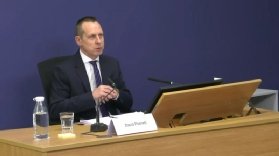
Former Post Office investigator David Posnett and colleagues were given bonuses based on a performance score, which was partly calculated based on how much money was recovered from subpostmasters in deficit.
Posnett told phase four of the inquiry that all financial investigators had bonuses that were linked to recovering money, as did those in the Post Office security department responsible for investigating subpostmasters who had unexplained shortfalls, which often led to prosecutions.
While the Post Office was prepared to pay staff bonuses to recover money and, according to Posnett, allow a department not seen as a profit generator to contribute to the company’s bottom line, it was reluctant, due to costs, to request underlying Horizon data during investigations of subpostmasters who claimed losses were caused by the system. This information, known as audit record query (ARQ) data, could have proved the subpostmasters were not to blame for the losses, but the Post Office was reluctant to use it because it had a limit on how many requests it could make for free before Fujitsu charged.
Posnett agreed that the Post Office was reluctant to request ARQ data because it would incur a cost and that the Post Office would limit the scope of requests to save money. “If the limit was reached, we would have to pay extra. We paid for services as part of the contract, and if we went over that we got charged extra,” he said.
Posnett could not remember the amount, but when asked by counsel to the inquiry Jason Beer KC whether it was seen as a sum of a level that acted as a “disincentive” to seek ARQ data beyond the limit, he said this was possible.
- Read Computer Weekly’s report on David Posnett’s evidence
- Watch David Posnett’s evidence in phase four of the inquiry
Alan Lusher, former Post Office auditor and contracts advisor
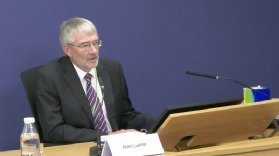
During phase four of the Post Office Horizon IT Inquiry, former Post Office auditor and contracts advisor Alan Lusher revealed the preconceived notion of auditors and investigators when they visited branches with shortfalls.
He said when problems arose in branches, the first presumption was that the subpostmasters accounts were in a mess, which could be caused by a subpostmaster stealing money. “We referred colloquially to office accounts sometimes being in a muddle and sometimes as a result of a fiddle,” he told the public inquiry.
This confirmed previous details that Post Office staff had preconceived and derogatory views of the people who ran Post Office branches. During an earlier phase of the public inquiry, Jeremy Folkes, former senior tech lead at the Post Office, said investigators were so convinced that subpostmasters were cooking the books that they failed to investigate alleged IT problems.
Lusher’s evidence also revealed that the Post Office was only concerned about its own business and not the businesses or welfare of its subpostmasters. During the inquiry hearing, it emerged that when shortfalls were found that could not be explained at branches, the Post Office was more likely to suspend subpostmasters in small branches than those at large branches with high revenue streams.
- Read Computer Weekly’s report on Alan Lusher’s evidence
- Watch Alan Lusher’s evidence in phase four of the inquiry
Susanne Helliwell, external solicitor acting for the Post Office
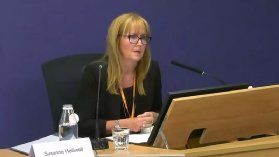
During questioning in phase four of the public inquiry, Susanne Helliwell, a solicitor acting for the Post Office in the earlier Cleveleys case, admitted that the Post Office was eager to prevent publicity of the dispute and not set a precedent that could see other subpostmasters challenge the system when they suffered losses.
An email from a Fujitsu worker to a colleague in June 2004 gave an account of a conversation he had with Mandy Talbot at the Post Office, with a trial date in the Cleveleys case set. “The Post Office are still taking advice as to how best to deal with this and [Mandy Talbot’s] view/belief was that the safest way to manage this is to throw money at it and to get a confidentiality agreement signed,” he wrote, adding that the Post Office was determined to keep evidence of Horizon problems secret. “[Mandy] is not happy with the ‘expert’s’ report as she considers it to be not well balanced and wants, if possible, to keep it out of the public domain. This is unlikely to happen if it goes to court.”
Helliwell was asked whether the suppression of Coyne’s report was a “cover-up”. She said: “It wasn’t a matter of covering up because [the subostmaster] could have told anybody about the findings of the report.” But the subpostmaster at the Cleveleys branch was made to sign a non-disclosure agreement when a settlement was agreed.
- Read Computer Weekly’s report on Susanne Helliwell’s evidence
- Watch Susanne Helliwell’s evidence in phase four of the inquiry
John Breedon, former Post Office contract manager
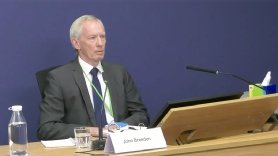
John Breedon, a former Post Office contract manager, told phase four of the public inquiry that the terms of the contract he was pushing on subpostmasters was not something he would “personally want to sign”.
He said the “obligations were all on the subpostmaster” and that it “put them on the hook for doing everything”.
Jason Beer KC, barrister to the public inquiry, asked Breeden why this view was not expressed in his 16-page written evidence. He said he didn’t know but admitted, when prompted, that it was “perhaps” because he wasn’t asked directly.
A key part of the Horizon scandal was that the contract contained a clause that stated: “The subpostmaster is responsible for all losses caused through his negligence, carelessness or error and also for all losses caused by his assistants. Deficiencies due to such losses must be made good without delay.”
Unless they could prove there was some other cause, such as a bug in the Horizon system, they would have to pay.
- Read Computer Weekly’s report on John Breedon’s evidence
- Watch John Breedon’s evidence in phase four of the inquiry
Chrisopher Knight, current member of the Post Office security team
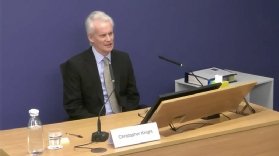
Christopher Knight, who joined the government-owned organisation in 1983, remains part of the Post Office’s security team.
In his 40 years at the organisation, the one-time Post Office investigator has lived through Horizon’s complete life, but in his witness statement to the inquiry he claimed that during his time in the security team, he did not recall “a subpostmaster, subpostmaster assistant or Crown Office employee attributing a shortfall to problems with Horizon” before the group litigation order (GLO).
He said: “I do not recall being aware of any robust challenges to Horizon, other than the GLO.”
This stance was obliterated during his questioning, with the inquiry shown several documents that confirm Knight knew about subpostmaster challenges to Horizon when he was a Post Office investigator. He was shown a spreadsheet from 2011, which he had access to, that contained details of at least 20 cases where subpostmasters under investigation were raising issues with Horizon.
Knight was asked whether he accepted that at the time this email was sent he was aware that there were at least 20 cases where Horizon integrity had come into question. He said: “I would have to say yes, but I don’t know if at the time I comprehended that.”
- Read Computer Weekly’s report on Christopher Knight’s evidence
- Watch Christopher Knight’s evidence in phase four of the inquiry
Timeline: Computer Weekly articles about the scandal since 2009
- May 2009: Bankruptcy, prosecution and disrupted livelihoods – postmasters tell their story.
- September 2009: Post-masters form action group after accounts shortfall.
- November 2009: Post Office theft case deferred over IT questions.
- May 2010: A pilot of the new Horizon Online system at Royal Mail has been scaled back after connectivity problems and outages.
- February 2011: Post Office faces legal action over alleged accounting system failures.
- October 2011: 85 subpostmasters seek legal support in claims against Post Office computer system.
- June 2012: Post Office launches external review of system at centre of legal disputes.
- January 2013: Post Office admits Horizon system needs more investigation.
- January 2013: Post Office announces amnesty for Horizon evidence.
- January 2013: Post Office wants to get to bottom of IT system allegations.
- June 2013: Investigation into Post Office accounting system to drill down on strongest cases.
- July 2013: Post Office Horizon system investigation reveals concerns.
- October 2013: End in sight for subpostmaster claims against Post Office’s Horizon accounting system.
- October 2013: Former Lord Justice of Appeal Hooper joins Post Office Horizon investigation.
- November 2013: 150 subpostmasters file claims over “faulty” Horizon accounting system.
- September 2014: Fresh questions raised over Post Office IT system’s role in fraud cases.
- December 2014: MPs blast Post Office over IT system investigation and remove backing.
- December 2014: Why MPs lost faith in the Post Office’s IT investigation, but vowed to fight on.
- December 2014: MPs to debate subpostmaster IT injustice claims.
- December 2014: MP accuses Post Office of acting ‘duplicitously’ in IT investigation.
- January 2015: MPs force inquiry into Post Office subpostmaster mediation scheme.
- January 2015: Post Office faces grilling by MPs over Horizon accounting system.
- February 2015: Post Office CIO will talk to any subpostmaster about IT problems, promises CEO.
- March 2015: Post Office ends working group for IT system investigation day before potentially damaging report.
- March 2015: MPs seek reassurance over Post Office mediation scheme.
- March 2015: Retiring MP aims to uncover truth of alleged Post Office computer system problems.
- April 2015: Post Office failed to investigate account shortfalls before legal action, report claims.
- April 2015: Criminal Courts Review Commission set to review subpostmasters’ claims of wrongful prosecution.
- June 2015: Post Office looking to replace controversial Horizon system with IBM, says MP.
- July 2015: Campaigners call for independent inquiry into Post Office Horizon IT system dispute.
- October 2015: James Arbuthnot takes Post Office IT fight to House of Lords.
- November 2015: The union that represents Post Office subpostmasters has warned of a problem with the Horizon accounting system.
- November 2015: Post Office IT support email reveals known Horizon flaw.
- November 2015: Group litigation against Post Office being prepared in Horizon dispute.
- February 2016: Post Office faces group litigation over Horizon IT as subpostmasters fund class action.
- June 2016: Post Office chairman Tim Parker says there would be “considerable risk” associated with changing its Horizon computer system.
- November 2016: The legal team hired by a group of subpostmasters will take their case to the next stage.
- January 2017: The group action against the Post Office that alleges subpostmasters have been wrongly punished for accounting errors gets green light from the High Court of Justice.
- March 2017: 1,000 subpostmasters apply to join IT-related group litigation against Post Office.
- April 2017: Investigation into claims of miscarriages of justice in relation to a Post Office accounting system has appointed a forensic accountant firm.
- May 2017: Hundreds of subpostmasters have applied to join IT-related legal action since March.
- July 2017: Post Office defence in computer system legal case due this week.
- August 2017: Campaigners submit initial evidence in group litigation against Post Office over controversial Horizon IT system.
- October 2017: Subpostmasters’ group action against the Post Office reaches an important milestone.
- November 2017: An end is in sight for subpostmasters’ campaign against alleged wrongful prosecution, which they blame on a faulty computer system.
- November 2017: The High Court judge managing the subpostmasters versus Post Office legal case over an allegedly faulty computer system tells legal teams to cooperate.
- January 2018: Forensic investigation into Post Office IT system at centre of legal case nears completion.
- April 2018: Criminal Cases Review Commission forensic examination of the IT system at the centre of a legal case against the Post Office has raised further questions.
- May 2018: Post Office branches unable to connect to Horizon computer system for several hours after morning opening time.
- October 2018: After over a decade of controversy, next week marks the beginning of a court battle between subpostmasters and the Post Office.
- November 2018: Case against Post Office in relation to allegedly faulty computer system begins in High Court.
- November 2018: High Court case in which subpostmasters are suing the Post Office reveals known problem with a computer system.
- November 2018: A High Court trial, where subpostmasters are suing the Post Office for damages caused by an allegedly faulty IT system, ends second week.
- November 2018: Post Office director admits to Horizon errors and not sharing details with subpostmaster network.
- November 2018: The High Court trial in which subpostmasters are suing the Post Office has reached an important stage.
- December 2018: CCRC may hold off subpostmaster decision until after Post Office Horizon trial.
- December 2018: Court case where subpostmasters are suing the Post Office set to span at least four trials and extend into 2020.
- January 2019: Subpostmasters’ campaign group attacks Post Office CEO Paula Vennells’ New Year honour amid ongoing court case.
- January 2019: Thousands of known errors on controversial Post Office computer system to be revealed.
- March 2019: Tech under spotlight at High Court in second subpostmasters versus Post Office trial.
- March 2019: Post Office considered Horizon IT system “high-risk”, court told.
- March 2019: CCRC watching Post Office Horizon trial closely.
- March 2019: Judge rules that Post Office showed “oppressive behaviour” in response to claimants accused of accounting errors they blamed on Horizon IT system.
- March 2019: Post Office “lacked humanity” in the treatment of subpostmasters, says peer.
- March 2019: A High Court judge heard that the Post Office did not investigate a computer system error that could cause losses, despite being offered evidence.
- March 2019: The Post Office legal team in the case brought by subpostmasters has called for the judge to be recused after questioning his impartiality.
- March 2019: A senior civil servant asked the Post Office to repay public money it had wrongly allocated to paying legal costs.
- April 2019: Subpostmaster claimants’ legal team makes application for the Post Office to pay millions of pounds of costs associated with trial.
- April 2019: Post Office to appeal judgment from first Horizon trial.
- April 2019: The Post Office’s claim that the judge overseeing the case concerning its controversial Horizon IT system was biased has been dismissed.
- April 2019: MP questions government over Post Office Horizon case.
- April 2019: Government says no conflict of interest in trial despite Post Office chairman’s dual role.
- May 2019: The Court of Appeal has refused the Post Office’s application to appeal a major decision in the Horizon IT trial.
- May 2019: The Post Office has applied for permission to appeal judgments from the first trial in its IT-related legal battle with subpostmasters.
- May 2019: The judge in the Post Office Horizon trial has ordered the organisation to pay the legal costs, and refused permission to appeal major judgment.
- June 2019: Post Office asks Court of Appeal for permission to appeal judgment in first Horizon trial.
- July 2019: The Post Office has admitted that some subpostmasters are at risk of accounts not balancing due to an error it does not understand.
- July 2019: Problem revealed during High Court trial left subpostmaster with £18,000 surplus after IT system failed to register full amount of cash scanned in.
- August 2019: Subpostmasters suffering slow running and frozen terminals while Post Office searches for a fix to issues.
- August 2019: The Post Office has fixed the latest problems with its Horizon system, affecting hundreds of branches.
- October 2019: A High Court judgment for a trial that focused on the Post Office’s IT system will be announced early next month.
- November 2019: The Court of Appeal has rejected a Post Office application to appeal judgments made in its battle with subpostmasters over IT failures.
- November 2019: Peer calls for clear-out of Post Office board after Court of Appeal confirms major court defeat.
- December 2019: The Post Office has settled its long-running legal dispute with subpostmasters, and will pay £57.75m in damages.
- December 2019: Subpostmasters ended their legal battle with the Post Office at the optimal time.
- December 2019: Subpostmasters proved right on IT system failures as calls for full public inquiry mount.
- December 2019: Criminal Courts Review Commission to review Horizon judgment “swiftly”.
- December 2019: National Federation of Subpostmasters cries foul after court ruling on controversial computer system.
- December 2019: Former Post Office CEO apologises to subpostmasters over Horizon scandal.
- December 2019: Call for former Post Office CEO to step down from public roles after IT court battle lost.
- January 2020: Fujitsu must face scrutiny following Post Office Horizon trial judgment.
- January 2020: Subpostmaster group calls for government to pay legal costs for Horizon trial.
- January 2020: Why subpostmasters are calling on the government to pay Horizon trial costs.
- January 2020: Government says it did not make decisions in the Post Office’s recent court battle.
- January 2020: Government should not be allowed to dismiss subpostmasters’ claims over Horizon IT scandal.
- January 2020: Police sent information about potential Fujitsu staff perjury in subpostmaster prosecutions.
- January 2020: Subpostmaster prosecutions are a significant step closer to being sent to the Court of Appeal.
- January 2020: Alan Bates: The “details man” the Post Office paid the price for ignoring.
- February 2020: The government has refused to pay the huge legal costs subpostmasters incurred in their battle with Post Office.
- February 2020: MPs seeking a public inquiry into the Post Office scandal face huge challenges, but pressure and time could force justice.
- February 2020: Calls for inquiry into Post Office IT scandal increase in Parliament, with cross-party support.
- February 2020: Care Quality Commission to review concerns over Paula Vennells’ appointment.
- February 2020: Government admits it was too passive managing Post Office as parliamentary pressure builds.
- February 2020: Minister says Post Office IT experts misled the government when it asked questions about IT system.
- March 2020: Boris Johnson commits to “getting to the bottom of” Post Office Horizon IT scandal.
- March 2020: Boris Johnson’s commitment to inquiry into Post Office scandal in doubt.
- March 2020: MPs call on PM to commit to full public inquiry into Post Office Horizon IT scandal.
- March 2020: Those who did not play by the rules in Post Office Horizon scandal “should face prosecution”.
- March 2020: MPs told to hold to account those responsible for Post Office Horizon IT scandal.
- March 2020: The Post Office has sparked anger with secret settlements with subpostmasters outside the recent legal action against it.
- March 2020: Labour MP Karl Turner: Post Office Horizon scandal is the "most grotesque version of predatory capitalism" he has ever seen.
- March 2020: MP Kevan Jones has warned a government minister not to repeat the mistakes of predecessors in Post Office Horizon scandal.
- March 2020: Criminal Cases Review Commission to use Microsoft Teams to ensure review of subpostmaster prosecutions is held on time.
- March 2020: Post Office postpones subpostmaster compensation scheme amid Covid-19 crisis.
- March 2020: Meeting reviewing subpostmaster applications to appeal criminal prosecutions moves into second day.
- March 2020: Subpostmaster prosecutions to be considered by Court of Appeal for miscarriages of justice.
- March 2020: How subpostmasters made legal history with biggest referral of potential miscarriages of justice.
- April 2020: Met Police examines information about evidence given in court by Fujitsu staff on the Horizon IT system.
- May 2020: Subpostmasters who had their lives ruined by the Post Office’s faulty IT system have received their damages after a High Court victory.
- May 2020: A senior Post Office executive who tried to mislead a High Court judge in relation to it, has left the organisation without fanfare.
- May 2020: Post Office re-examines hundreds of prosecutions that could have resulted from faults in Horizon IT system.
- June 2020: Subpostmasters prosecuted for theft and false accounting by the Post Office raise money to help clear the names of victims of the scandal.
- June 2020: Subpostmasters to force scrutiny of government’s role in Post Office IT scandal.
- June 2020: The Criminal Cases Review Commission sends 47 more subpostmaster cases to Court of Appeal.
- June 2020: Select committee chair writes to former Post Office CEO demanding answers over her role in IT scandal.
- June 2020: The government has been accused of launching a review that fails in getting to the bottom of one of the biggest miscarriages of justice in UK history.
- June 2020: Subpostmasters will not cooperate with government review into IT scandal.
- June 2020: The government’s proposed review of the Post Office IT scandal has received a further setback as forensic accountants join subpostmasters in refusing to back it.
- June 2020: Call for government review of Post Office Horizon scandal to have the power to force individuals to give evidence under oath.
- June 2020: Subpostmasters seeking justice in the Post Office Horizon IT scandal are regaining momentum in Parliament.
- June 2020: Healthcare regulator will be discussing concerns about former NHS boss chairing an NHS trust at an upcoming meeting.
- June 2020: Second Sight is working with law firm in appeals by subpostmasters against criminal convictions in Horizon IT scandal.
- June 2020: Post Office and Fujitsu blame each other for many of the failings in the Horizon IT scandal that wrecked lives.
- June 2020: Parliamentary Justice Committee to hold short inquiry into the rules and regulations surrounding private organisations’ ability to initiate criminal proceedings.
- July 2020: Victims of the Post Office Horizon IT scandal need to raise thousands of pounds in a week or those responsible for their suffering will avoid scrutiny.
- July 2020: The government is set to face scrutiny over its involvement in the Post Office Horizon IT scandal.
- September 2020: The government repeats that it won’t pay victims’ legal costs and confirms review into the scandal will not have the power to call witnesses.
- September 2020: Subpostmasters still not being told about all the known errors in the controversial Post Office branch accounting and retail system that they use.
- October 2020: The Post Office has chosen not to contest 44 out of 47 subpostmaster appeals, but others still face a Court of Appeal battle for justice.
- October 2020: MPs are demanding the government holds a full statutory public inquiry into the Post Office IT scandal.
- October 2020: NHS regulator continues enquiries about the appointment of former Post Office CEO at Imperial College Healthcare NHS Trust as more damning details emerge.
- October 2020: Government minister met with former subpostmaster online in an attempt to get victims of the Post Office Horizon scandal involved in government review.
- October 2020: The Post Office is focusing urgently on fixing an IT error suffered by a subpostmaster amid the ongoing IT scandal.
- October 2020: Labour politicians are calling for the government to give the Post Office Horizon scandal inquiry the power to force witnesses to give evidence if they don’t cooperate.
- October 2020: Imperial College Healthcare NHS Trust has asked for external review of its process when appointing controversial executive.
- November 2020: Government faces scrutiny of its handling of the Post Office IT scandal that destroyed subpostmasters’ lives and livelihoods.
- November 2020: Post Office branches offline during busy business hours after suffering an IT error that the Post Office said related to IT from supplier Fujitsu.
- November 2020: Fujitsu is refusing to explain what caused a national system outage in Post Office branches last week, despite being blamed.
- November 2020: The Met Police open criminal investigation into Fujitsu staff who gave evidence in trials of wrongly prosecuted subpostmasters .
- November 2020: Post Office criticised over vagueness of its explanation of the cause of a UK-wide IT failure that saw subpostmasters unable to do business.
- November 2020: Post Office says planned firmware update caused the problem that left branches unable to do business for 90 minutes.
- November 2020: Court documents reveal the names of the Fujitsu employees under investigation for potentially providing misleading information in criminal trials.
- November 2020: The government allowed the Post Office to ‘run amok’ and destroy lives, says complaint to Parliamentary Ombudsman.
- November 2020: Campaigning politician demands access to documents that could prove that the Post Office lied.
- December 2020: Government denies responsibility for the abuse inflicted on subpostmasters by the Post Office over faulty IT system.
- December 2020: CEO at the centre of the scandal that saw innocent people bankrupted and some sent to prison steps down from NHS role as pressure for her resignation grows.
- December 2020: History made as subpostmasters wrongly prosecuted in Horizon IT scandal have convictions quashed.
- December 2020: The appointment of a former Post Office executive, who tried to mislead a judge, in the Football Association of Wales has been questioned by an MP.
- December 2020: Court of Appeal indicates subpostmasters can pursue appeal route that could do more damage to Post Office’s reputation.
- January 2021: NHS trust defends its director appointment process following an external review of its recruitment of former Post Office CEO Paula Vennells.
- January 2021: Lawyers call for changes to digital evidence rule that made it easier for the Post Office to ‘bamboozle courts’ and make subpostmasters pay a heavy price for its IT failings.
- January 2021: The Criminal Cases Review Commission (CCRC) has referred four more subpostmasters’ criminal convictions to appeal, as part of the biggest miscarriage of justice in modern UK history.
- February 2021: A former Fujitsu senior developer who worked for Fujitsu claimed bosses knew of fundamental flaws in Post Office system before going live.
- February 2021: Subpostmasters call for Boris Johnson to pause and reshape the government’s Horizon inquiry.
- February 2021: Vote of no confidence in Football Association of Wales boss triggered by recruitment of former Post Office executive who tried to mislead a judge in IT trial.
- March 2021: Government agrees to change private prosecution rules that were abused by the Post Office in its pursuit of subpostmasters wrongly accused of financial crimes.
- March 2021: Subpostmaster victims who have spent millions bringing the Post Office IT scandal to light have received no reply to their concerns from Boris Johnson.
- March 2021: MP condemns department’s ‘bizarre’ rejection of freedom of information request linked to Post Office IT scandal.
- March 2021: Football Association Wales boss steps down after losing confidence motion triggered by appointment of an executive involved in the Post Office IT scandal.
- March 2021: The Scottish Criminal Cases Review Commission (SCCRC) is reviewing five cases of potential miscarriage of justice in relation to subpostmaster prosecutions.
- March 2021: Subpostmasters heading to Court of Appeal to clear their names in what is potentially the biggest miscarriage of justice in English legal history.
- March 2021: The Post Office does not have enough money to pay compensation to the subpostmasters it wrongfully prosecuted.
- March 2021: Angela van den Bogerd has left her role at the Football Association of Wales, following criticism of her part in Post Office IT scandal.
- March 2021: Court of Appeal hearing reveals Post Office instructed employees to destroy documents that undermined an insistence that its Horizon computer system was robust.
- March 2021: The Post Office was warned that a former Fujitsu employee had misled courts when giving evidence on its behalf.
- March 2021: Boris Johnson agrees with MP that those responsible for the Post Office Horizon scandal should be brought to book.
- March 2021: Former Post Office chief was paid over £400,000 when she left despite the organisation being involved in what would become the biggest miscarriage of justice in UK history.
- April 2021: The UK government faces a potential judicial review over its Post Office Horizon IT scandal inquiry, after subpostmasters formally wrote to the government seeking one.
- April 2021: The government is listening to calls for changes in how digital evidence is considered in court, as Post Office IT scandal spells out current rule’s inadequacy.
- April 2021: The Post Office's controversial contract with Fujitsu has been extended another year to help the organisation manage its exit.
- April 2021: The Post Office is to move work done by Fujitsu in-house when its outsourcing contract ends, and is already recruiting IT experts.
- April 2021: The Post Office has revealed the end to its controversial Horizon IT system which, through its errors and the Post Office's denial of them, caused huge suffering.
- April 2021: The UK government is the only block to fair compensation for subpostmasters who were wrongly punished for accounting shortfalls.
- April 2021: The Court of Appeal has overturned the criminal convictions of 39 subpostmasters who were blamed and punished for accounting shortfalls caused by computer errors.
- April 2021: Former Post Office CEO Paula Vennells has left roles in the church, Morrisons and Dunelm after postmasters’ convictions were overturned in the Court of Appeal.
- April 2021: The biggest miscarriage of justice in UK history is set to get bigger as more subpostmasters take their cases to the Court of Appeal.
- May 2021: Post Office IT scandal CEO has no excuse for her inaction in preventing the biggest miscarriage of justice in UK history, says Criminal Cases Review Commission chairperson.
- May 2021: Subpostmasters, MPs and the public call for a full statutory judge-led public inquiry into the Post Office Horizon scandal, following another damning court judgment.
- May 2021: Government says it wants to ensure a fair pay-out for the 555 subpostmasters who defeated the Post Office in a legal battle.
- May 2021: The Post Office has contacted hundreds of people it might have wrongly prosecuted for financial crimes.
- May 2021: The miscarriages of justice involving subpostmansters are the most disturbing element of the Post Office Horizon scandal – but it goes much deeper.
- May 2021: The supplier at the centre of the Post Office Horizon scandal has so far escaped the ramifications of its role in the biggest miscarriage of justice in UK history.
- May 2021: Another two former subpostmasters have had their convictions for financial crimes overturned, following a hearing in Southwark Crown Court.
- May 2021: The government inquiry into the Post Office Horizon scandal is set to be made statutory with the power to compel witnesses and evidence.
- May 2021: The government confirmed that the inquiry into the Post Office Horizon IT scandal will be given statutory status and wider scope.
- May 2021: The Justice for Subpostmasters Alliance has agreed to meet the former judge heading up the inquiry into the Post Office scandal that ruined the lives of hundreds of subpostmasters.
- May 2021: Criminal Cases Review Commission will not allow pressure on its resources to prevent subpostmasters seeking a review of their criminal convictions.
- May 2021: Professional IT body wants changes to how computer evidence is used in court in the wake of the Post Office case.
- June 2021: The Post Office Horizon scandal inquiry begins with subpostmaster campaign group waiting for full details before committing its support.
- June 2021: What the Post Office told government about decision to sack investigators examining subpostmaster prosecutions could identify if the government was part of a cover-up.
- June 2021: The Post Office has so far compensated about 400 subpostmasters who suffered losses as a result of computer errors that they were wrongly blamed for.
- July 2021: Another 10 subpostmasters are set to have their criminal convictions quashed as part of one of the biggest miscarriage of justice in British history.
- July 2021: The government has made no contact with subpostmasters two months after it said it would work with them to ensure they get speedy and fair compensation.
- July 2021: The cost of a scheme set up to compensate subpostmasters who were victims of the Horizon IT scandal will exceed £300m.
- July 2021: The government will pay interim compensation within weeks to subpostmasters who were wrongly convicted of crimes due to computer errors.
- August 2021: A further four subpostmasters are set to have their wrongful convictions overturned in the latest development in the Post Office Horizon scandal.
- August 2021: The government has failed to provide fair compensation to the subpostmasters who exposed the full extent of the Horizon scandal to the world.
- August 2021: Subpostmasters demand more clarity on Horizon public inquiry before committing their support.
- September 2021: Six more subpostmaster convictions referred for appeal in Post Office IT scandal.
- September 2021: Government minister holds secret meeting with Post Office Horizon scandal victims.
- October 2021: The public inquiry into a scandal that saw subpostmasters imprisoned after being blamed for accounting shortfalls will hold its first public hearing early next month.
- October 2021: Government minister investigating Horizon IT project in 2000 described the Post Office board as ‘appalling, short-sighted and partisan’.
- November 2021: The behaviour of Post Office senior management during the Horizon scandal was so egregious that the supplier of the faulty software has escaped a large financial penalty.
- November 2021: Former Fujitsu staff who gave evidence in subpostmaster trials have been questioned by police for a second time.
- November 2021: Former subpostmasters convicted of crimes based on data from error-prone Post Office computer system continue to embark on appeals.
- November 2021: The first hearing in the Post Office Horizon scandal public inquiry hears why victims should be paid compensation immediately.
- November 2021:The Scottish Criminal Cases Review Commission is investigating eight potential miscarriages of justice linked with faulty Post Office IT system.
- November 2021: The Post Office will waive professional legal privilege for documents relating to legal advice it received regarding subpostmaster prosecutions.
- November 2021 A total number of 65 subpostmasters have now had criminal convictions overturned in Post Office Horizon scandal.
- November 2021 Subpostmasters asked to withdraw support for Post Office scandal inquiry.
- November 2021: Seven more subpostmasters have been cleared after the Post Office charged them for crimes caused by its faulty Horizon software.
- November 2021: The Post Office made clear its support for a change in UK law regarding computer evidence – which later helped to wrongfully convict subpostmasters.
- November 2021: The chair of the Post Office scandal public inquiry has confirmed the compensation of a group of subpostmasters will be revisited.
- December 2021: Government must go further after agreeing to pay compensation for wrongly convicted subpostmasters.
- December 2021: Pressure on government to pay fair compensation to subpostmasters left out of current schemes.
- January 2022: Almost 100 MPs have backed a call for the government to reverse its decision to exclude 555 subpostmasters from fair compensation.
- January 2022: A parliamentary select committee was told that the Post Office is unable to accurately calculate compensation for some Horizon scandal victims.
- January 2022: The Post Office received subsidies worth over £1bn last year to pay subpostmaster compensation.
- January 2022: Government widens subpostmaster miscarriage of justice compensation scheme in Horizon scandal.
- January 2022: Government officials are open to finding a way to properly compensate victims of the Horizon scandal without setting a dangerous legal precedent.
- January 2022: The subpostmaster campaign group responsible for exposing the Post Office Horizon scandal is to meet with the government to discuss fair compensation.
- January 2022: Fujitsu cannot hide away as taxpayers pick up the bill for the Post Office scandal triggered by its IT system, say peers.
- February 2022: Victims of the Post Office Horizon scandal are being denied the millions of pounds they are owed as the government delays compensation resolution.
- February 2022: Victims of the Post Office Horizon scandal are due to tell their devastating stories to the statutory inquiry.
- February 2022: MPs are demanding urgent action by the government to provide full compensation to a group of 555 Post Office Horizon scandal victims who have so far been left out.
- February 2022: Victims of the Post Office Horizon scandal have been suffering in silence for many years, but the current public inquiry is giving them a voice, and people are listening.
- February 2022: Horizon inquiry questioning raises hopes of fair compensation for victims so far left out.
- February 2022: Government set to backtrack on untenable position on subpostmaster compensation.
- March 2022: The Post Office and Fujitsu failed to alert subpostmasters to a software error that caused them to be wrongly blamed for accounting shortfalls.
- March 2022: Horizon inquiry hearing sheds light on subpostmaster federation’s role in hushing up IT problems.
- March 2022: 555 subpostmasters to get fair compensation after government U-turn on its stance on High Court settlement.
- March 2022: Compensation goal finally in sight for 555 Post Office scandal victims, after 13 year campaign.
- April 2022: Fujitsu bags £430m government contracts despite rising cost of Post Office Horizon scandal.
- April 2022: The Scottish Criminal Cases Review Commission expects more subpostmasters with potential wrongful convictions to come forward.
- April 2022: Former subpostmasters who were wrongfully convicted and punished for crimes have not yet received full compensation over a year after their convictions were overturned.
- April 2022: A former Fujitsu worker has been questioned under caution for the third time as police investigate potential perjury in trials of subpostmasters wrongfully convicted of financial crimes.
- May 2022: Paula Vennells could be stripped of her CBE as the Honours Forfeiture Committee commits to reconsider its award in the light of the Post Office Horizon scandal.
- May 2022: Lawyer negotiating compensation for victims of Post Office scandal says the two sides are ‘poles apart’ on valuations.
- May 2022: Inquiry into Post Office scandal moves to Scotland, with differences in English and Scottish law raising further serious questions about subpostmaster prosecutions.
- May 2022: The chair of the Post Office Horizon scandal inquiry has brought forward hearings about compensation as victims warn that at this rate “people will die” before they get anything.
- May 2022: The Criminal Cases Review Commission is to contact 88 more potentially wrongfully convicted Post Office workers.
- May 2022: The Post Office Horizon IT system at the centre of a national scandal will be replaced by 2025, with a supplier expected to be named in August.
- May 2022: Victims of the Post Office Horizon scandal in Scotland raise further questions about Post Office and government conduct.
- May 2022: Government accused of ‘passing the buck’ and ‘not knowing what it is talking about’ after stating it has no plans to review court rules on computer evidence.
- May 2022: Computer Weekly spoke to the barristers at Henderson Chambers that fought the Post Office in the High Court to expose the widest miscarriage of justice in UK history.
- June 2022: Two more Post Office Horizon scandal victims have had their wrongful convictions overturned.
- June 2022: The 555 subpostmasters who exposed the depth of the Post Office Horizon scandal could finally be fairly compensated.
- June 2022: Forensic accounting firm that ‘knows where the bodies are buried’ will be released from confidentiality obligations by the Post Office to give evidence to public inquiry.
- June 2022: Lawyers negotiating the compensation valuations for former subpostmasters who suffered wrongful convictions have brought in independent judicial scrutiny to break an impasse.
- June 2022: Subpostmaster campaign group is a step closer to achieving what it was originally set up to do as government launches compensation scheme for its members who did not receive fair payouts.
- July 2022: More former subpostmasters have their wrongful convictions for theft and fraud overturned in the Court of Appeal.
- July 2022: When the Post Office’s lie about the Horizon system failed to silence subpostmaster critics, it took more extreme measures, say victims of the scandal.
- September 2022: The Met Police have interviewed a former subpostmaster as part of an investigation into potential perjury by former Fujitsu staff.
- September 2022: Chair of statutory public inquiry into the Post Office Horizon scandal has aired his disappointment over the slow progress in making interim payments to victims.
- October 2022: The public inquiry into the Post Office scandal has begun phase two with a request for adjournment amid allegations that the Post Office is failing to disclose relevant documents.
- October 2022: Victims demand that the perpetrators of the Post Office Horizon IT scandal face the public inquiry.
- October 2022: Fujitsu’s part in causing the extreme suffering of subpostmasters will be made clear as the IT supplier begins giving evidence at a statutory inquiry.
- October 2022: A dereliction of duty saw subpostmaster federation ignore its members when IT problems hit and allowed the Post Office destroy their lives.
- October 2022: Politicians are keeping up the pressure to block government contracts being awarded to Fujitsu because of its role in the Post Office Horizon scandal.
- October 2022: Problems reported with the Post Office’s Horizon IT system before its roll-out should have been regarded as a “show-stopper.”
- October 2022: Horizon system code writers lacked basic programming skills, according to the task force set up to investigate reported problems with the controversial software.
- October 2022: Trials of the Horizon computer system in Post Office branches in 1999 led to a warning from subpostmasters that software problems meant “a tragedy was not far away”.
- November 2022: Game of ‘hardball’ in Horizon negotiations left subpostmasters exposed to tragedy.
- November 2022: Confirmation bias led Post Office to prosecute subpostmasters without investigation, inquiry told.
- November 2022: SCCRC has referred six cases of potential wrongful convictions of subpostmasters to the High Court of Justiciary.
- November 2022: Fujitsu expert witness in subpostmaster trial ‘manoeuvred’ into role, public inquiry told.
- November 2022: Post Office changed view of Horizon problems before roll-out, because of a ‘sunk cost fallacy’.
- November 2022: Team working on controversial Post Office Horizon EPOSS software was the ‘joke of the building’.
- November 2022: The Post Office IT scandal inquiry’s appointed expert IT witness was “troubled” by the lack of integrity of data from the Horizon system that was used to send people to prison.
- November 2022: Telegram from British Embassy in Tokyo to UK government reveals pressure on ministers to sign off controversial contract.
- November 2022: Subpostmaster federation deliberately kept public in dark over computer problems.
- December 2022: Post Office boosted its ‘coffers’ as Horizon system threw up unexplained shortfalls, inquiry told.
- December 2022: Post Office scandal – “cock-up or cook-up”?
- December 2022: Criminal Cases Review Commission calls on more convicted subpostmasters to come forward.
- January 2023: Former subpostmaster Alan Bates, who ‘pulled up trees and moved mountains’, turns down OBE offer.
- January 2023: Advisory board goal for Post Office scandal victims to be returned to rightful financial position.
- January 2023: Former Fujitsu staff under police investigation to face Post Office IT scandal inquiry.
- February 2023: Post Office’s most senior executives hushed up Horizon errors, public inquiry told.
- March 2023: Post Office attempted to replace controversial Horizon system 10 years ago, but was put off by project’s scale and cost.
- March 2023: IT worker tells public inquiry that the Post Office Horizon helpdesk was toxic, rudderless and racist.
- March 2023: Subpostmaster demands names of Post Office executives who crushed him to suffocate truth.
- April 2023: CCRC says ‘door open’ for more reviews of subpostmaster convictions.
- April 2023: The Post Office has extended a contract with Fujitsu after being unable to resolve technical issues related to migrating its IT to the cloud.
- April 2023: Post Office paid IBM millions when it ended proposed contract to replace Horizon.
- April 2023: The Post Office ended a proposed contract with IBM to replace its controversial Horizon system after work had already started.
- May 2023: More Post Office software-related convictions overturned takes total to 86.
- May 2023: Fujitsu staff had ‘unrestricted and unauditable’ remote access to Post Office branch systems.
- May 2023: Post Office lawyer bragged how team ‘destroyed attack on the Horizon system’ and put woman in prison.
- May 2023: Post Office executive told to report false bill of health on controversial software.
- May 2023: Campaigning former subpostmaster fears compensation for scandal victims will be delayed to 2025.
- May 2023: Post Office scandal – cover-up a ‘dark chapter’ in government, corporate and legal history.
- June 2023: Post Office CEO told MPs that the organisation is telling some subpostmasters it won’t oppose them if they appeal.
- July 2023: Public inquiry hears how Post Office security withheld evidence from people it suspected of theft.
- July 2023: Former Fujitsu IT chief evidence postponed after late Post Office disclosure.
- July 2023: Post Office inquiry must examine role of court rules around use of computer evidence that enabled it to prosecute innocent people.
- July 2023: Peer calls for every Post Office prosecution to be reviewed.
- July 2023: Horizon inquiry adjourned as Post Office disclosure failures threaten to ‘derail’ proceedings.
- July 2023: Horizon inquiry chief threatens Post Office with ‘criminal sanctions’ over disclosure failures.
- July 2023: Subpostmaster compensation deadline will be missed, warns public inquiry chair.
- July 2023: CCRC refers two more subpostmaster convictions for appeal.
- July 2023: Post Office tried to convince independent IT witness that he was wrong about Horizon.
- August 2023: MP calls for review of computer evidence rule which led to subpostmasters being wrongly convicted.
- August 2023: Six subpostmaster appeals to be heard in Scottish court.
- September 2023: Post Office employee changed story for witness statement used to destroy subpostmasters.
- September 2023: Post Office had no interest in subpostmaster welfare when taking legal action, says Fujitsu memo.
- September 2023: Government offers £600,000 to subpostmasters with overturned convictions.
- September 2023: Five more subpostmasters have IT system-related convictions overturned.
- October 2023: Government ‘breached privacy’ of Horizon victims with compensation offer.
- October 2023: First subpostmaster Horizon conviction overturned in Scotland.
- October 2023: Amnesia hides names of individuals behind Post Office’s ‘head on a spike’ strategy.
- October 2023: ‘Angry’ lawyer warned against Post Office computer investigation in 2010 email.
- October 2023: Former Post Office executive admits he wouldn’t sign unfair contract he pushed on subpostmasters.
- October 2023: Post Office auditors presumed subpostmasters were ‘on the fiddle’ or ‘in a muddle’.
- October 2023: Bill for the scandal over £1bn, as campaign leader considers private prosecutions of Post Office executives.
- November 2023: Post Office disclosure failures delay Horizon scandal inquiry again.
- November 2023: Former Post Office manager has no memory of preparing witness statement in legal dispute.
- November 2023: Post Office scandal inquiry postpones more key witness hearings.
- November 2023: Controversial Fujitsu contract with Post Office extended again.
- November 2023: CCRC refers posthumous appeals against convictions to Crown Court for first time.
- November 2023: Paula Vennells’ email fuelled Post Office Horizon cult, inquiry told.
- November 2023: Slow government response to Post Office scandal compensation forces new legislation.
- December 2023: Post Office lawyer with his fingerprints all over IT scandal spreads blame.
- December 2023: Undisclosed document could reveal pressure on Fujitsu expert witness in Post Office prosecution.
- December 2023: Post Office prioritised its ‘bottom line’ over justice.
- December 2023: Former Post Office investigator called subpostmaster campaigners ‘crooks’.
- December 2023: Current Post Office executive in denial of Horizon cover-up.
- December 2023: Government advised to overturn all Post Office scandal convictions.
- December 2023: Government reveals its own slow progress in compensating Post Office scandal victims.
- December 2023: ‘No hiding place’ for those responsible for Post Office Horizon scandal.
- December 2023: Post Office gets government handout as Horizon replacement costs increase ‘significantly’.
- January 2024: Post Office Horizon scandal explained: Everything you need to know.
- January 2024: Metropolitan Police launches second criminal investigation in Post Office scandal.
- January 2024: The current rules around digital evidence are partly to blame for the widest miscarriage of justice in UK history.
- January 2024: Fujitsu gets stay of execution as MPs support exoneration of wrongfully convicted subpostmasters.
- January 2024: ‘Hero’ subpostmaster accuses government of diversion tactics through ‘weaselly’ statistics.
- January 2024: How Fujitsu became a central part of the Post Office scandal.
- January 2024: Hundreds of subpostmasters to have convictions quashed in blanket exoneration.
- January 2024: How legal disclosure failures disrupted the Post Office Horizon inquiry.
- January 2024: Fujitsu ‘morally obliged’ to contribute to subpostmaster financial redress amid ‘insane’ delays.
- January 2024: More than 900 subpostmaster convictions wouldn’t have happened without Post Office-backed law change.
- January 2024: Anger sparked by TV drama forces Fujitsu to put public sector contract bidding on hold.
- January 2024: Fujitsu boss describes Post Office behaviour as ‘shameful and appalling’.
- January 2024: Concerns of an expert witness in subpostmaster trials were ignored by Fujitsu.
- January 2024: Urgent question asks which ministers knew of Post Office's shocking plan to remove judge.
- January 2024: Fujitsu agrees to support former subpostmasters’ families beyond financial redress.
- January 2024: Committee chair asks minister to back ‘Mr Bates clause’ in Post Office compensation legislation.
- January 2024: Expert IT witness outsmarted an ‘aggressive’ Post Office to get to truth after inspection ‘madness’.
- January 2024: MP demands answers from government minister over second faulty Post Office IT system.
- January 2024: Pre-Horizon users contacting lawyers as more Post Office IT horror stories emerge.
- February 2024: Government ‘dragging it out’ by refusing to share knowledge of Post Office trial ‘delaying tactic’.
- February 2024: ‘People are now listening,' Post Office inquiry told as latest phase ends.
Read more on IT outsourcing
-
![]()
Fujitsu’s Post Office Horizon admission was ‘bombshell’ amid ‘religious panic’ over reliability
-
![]()
Alan Bates and JFSA won’t back down in fight with government and Post Office
-
![]()
Post Office boss said subpostmasters had hands in till and blamed technology for missing cash
-
![]()
Further extension to controversial Post Office contract with Fujitsu inevitable








